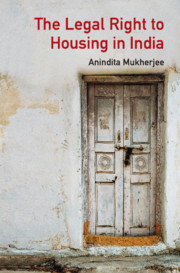Book contents
- Frontmatter
- Dedication
- Epigraph
- Contents
- Foreword
- Acknowledgements
- List of Abbreviations
- List of Cases
- List of Statutes
- Introduction
- 1 The Act of Definition
- 2 The Indian State in Response to Housing Claims
- 3 Mapping the Legal Environment
- Conclusions
- Annexure 1 Central Housing Law and Policy
- Annexure 2 National Campaign for Housing Rights
- Annexure 3 The National Right to Homestead Bill, 2013
- References
- Index
2 - The Indian State in Response to Housing Claims
Published online by Cambridge University Press: 26 April 2019
- Frontmatter
- Dedication
- Epigraph
- Contents
- Foreword
- Acknowledgements
- List of Abbreviations
- List of Cases
- List of Statutes
- Introduction
- 1 The Act of Definition
- 2 The Indian State in Response to Housing Claims
- 3 Mapping the Legal Environment
- Conclusions
- Annexure 1 Central Housing Law and Policy
- Annexure 2 National Campaign for Housing Rights
- Annexure 3 The National Right to Homestead Bill, 2013
- References
- Index
Summary
While there is no express articulation of the right to housing in Indian law, there is a substantial body of law and policy dealing with different constituents of the right, both directly and otherwise. This existing law and policy on housing operates through an almost bewildering array of state and non-state actors, whose inter se dynamics can sometimes be rather opaque. If just those that have a direct bearing on the right to housing are to be considered, the list would include the judiciary at different jurisdictions, three levels of government, constitutional and statutory planning authorities, housing boards and corporations, other parastatal bodies with varied functions and community-based organisations. A person staking a claim upon the state in the name of housing is called upon to navigate through this labyrinth of sorts. This complexity is a double-edged sword: it can sometimes work to the advantage of the claimant, but often it is a source of utter mystification.
It is a bane of Indian legislative and executive action that state-institutions are created with almost reckless disregard for what came before. For this reason, in practically every state, it is possible to trace different institutions with seemingly overlapping functions, find defunct institutions that have not been taken off the law books despite having been functionally replaced, or institutions that exist on paper but have not actually been set up. In part, it is this predilection for expedient, instead of reflective, law-making that creates the complex web of institutions mentioned. For the legal right to housing to be articulated in any meaningful manner, it is imperative that this web be understood to the greatest extent possible. Given that a substantial portion of the law relating to housing operates at the level of the district or the city, the reality of housing law and the dynamics involved amongst state and non-state actors varies across states, and even within states. It is unlikely that any one text can capture all of this difference, but the challenge before any movement seeking legislative intervention would be to learn from these diverse realities in order to create broader norms that speak to and enable the realisation of local requirements.
- Type
- Chapter
- Information
- The Legal Right to Housing in India , pp. 40 - 71Publisher: Cambridge University PressPrint publication year: 2019



